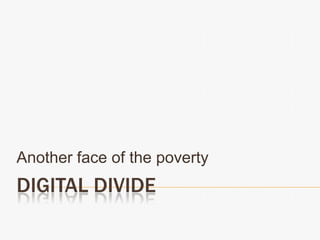
Digital divide
- 1. Another face of the poverty DIGITAL DIVIDE
- 2. DEFINITION The new information and communications technologies are among the driving forces of globalisation. They are bringing people together, and bringing decision makers unprecedented new tools for development. At the same time, however, the gap between information ‘haves’ and ‘have-nots’ is widening, and there is a real danger that the world’s poor will be excluded from the emerging knowledge-based global economy. (Kofi Anan, 2002) Hundreds of alternatives ways to define the digital divide
- 3. RESULT & CAUSE OF POVERTY Lack of adequate infrastructure and lack of knowledge are two major obstacles that impede mass connectivity. Poverty: non or lack access to necessary resources to live (standard human dignity) Technology → Information Online communications (Internet ): information, education, civil & political empowerment
- 4. THE GLOBAL DIGITAL DIVIDE
- 5. INTERNET USERS IN THE WORLD (2011)
- 6. WORLD INTERNET PENETRATION (2011)
- 7. SUMARY OF THE GAP All of the developing countries of the world own 4% of the world’s computers. 97 % of adolescents live in developing world. 75 % of the world’s 700 million telephone sets can be found in the 9 richest countries. High percentage of developing country residents live in rural areas. The proportion can rise to as much as 85 percent of the population in the least developed countries and is estimated at 75 percent overall in Asia. Rural access to communication networks in developing countries is much more limited than in urban areas.
- 8. DIMENSION OF THE PROBLEM
- 9. MULTIPLE SOLUTION Problematic: The term “Digital Divide” access requires only purchase and installation of technology. But: multiple dimensions → it is not only money and technology that matter Eliminating the digital divide requires more than the provision of access to technologies. (can contribute but isn’t sufficient for development) Socio + Economic development + ITC
- 10. IT ARE CAPABLE OF ALLEVIATING POVERTY? Telephone (line & mobile... Still expensive in rural areas) Radio (& Television) Public address system (Asia, more localized than radio, but less simple and inexpensive) Computers and the Internet (http://practicalaction.org/video/view/dryingvegetabl es)
- 11. TELEPHONE AND RADIO... Research on poor communities suggests that the telephone and radio remain the most important (direct access) ICT tools for changing the lives of the poor
- 12. WHY INTERNET? Telecentre School (“one laptop for children”) Small business Internet in one mean of communication & commerce It’s a very useful gadget
- 13. WHY INTERNET? But it will become in THE MEAN OF COMMUNICATION & COMMERCE All of the developing countries of the world own 4% of the world’s computers. 97 % of adolescents live in developing world.
